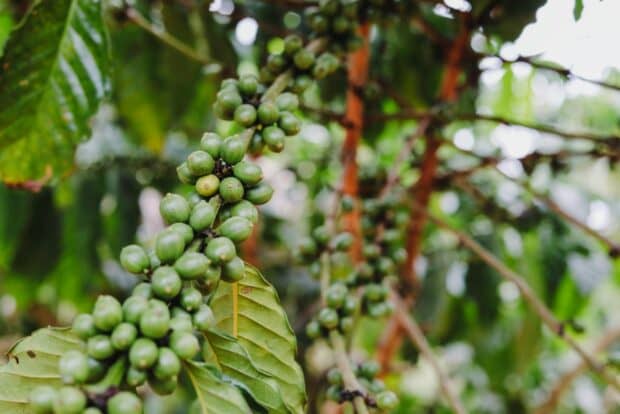[[{“value”:”
Uganda’s coffee production and exports are expected to rise in 2024/25, thanks to favorable crop conditions, targeted interventions to combat pest and disease and the maturation of young plants.
The country is also expected to see an uptick in coffee consumption as coffee culture grows, particularly in Kampala and other cities.
These and other predictions are outlined in the new USDA Foreign Agriculture Service annual report on the Uganda coffee sector.
[Note: This is part of a series of stories that will explore USDA FAS annual coffee reports. The information agency typically delivers more than a dozen country-level reports on the coffee sector, each coming from different authors and field offices, with predictions for the 2024/25 market year.]
Production
The FAS post, based in Nairobi, Kenya, estimates Uganda’s coffee production for market year 2024/25 will rise by 1.44%, reaching the equivalent of 6.9 million bags, thanks to better crop management and improved yields.
Robusta coffee is expected to account for approximately 63% of the production increase, while arabica will account for 38%, a notable shift from the country’s traditional 80-20 split in favor of robusta.
The author notes that most of Uganda’s coffee is grown by smallholder farmers, typically on less than half a hectare in mixed farming systems that integrate other crops. Smallholders typically use minimal inputs, meaning they may be less negatively impacted by higher fertilizer costs, according to the report.
Marketing and Policy
The report notes that Uganda’s coffee industry is “fully liberalized,” enabling direct transactions between farmers and traders.
Certification programs like Fairtrade, Rainforest Alliance and Organic certification have proven to promote fair pricing and market access in Uganda, while also improving coffee quality and farmer livelihoods, according to the report.
The report notes that the Ugandan government is implementing reforms to enhance competitiveness and sustainability, focusing on better extension services, access to inputs, quality control, value addition and market diversification.
Domestic Consumption
Coffee consumption in Uganda for 2024/25 is forecast to grow by 1.52%, reaching approximately 330,000 bags, driven by a growing coffee culture.
The report notes that the number of coffee shops in Uganda has grown exponentially over the past decade.
The Uganda Coffee Development Authority (UCDA) actively promotes coffee consumption, contributing to the rising popularity of coffee in the country, the report states.
Trade
Uganda’s green coffee exports are expected to rise slightly from 6.52 million to 6.58 million bags in 2024/25, driven by higher production.
The EU, United States, Morocco and India remain Uganda’s main coffee export destinations.
To comply with the new EU deforestation-free products law (EUDR), the Ugandan government is planning to register all coffee farmers and establish a national traceability system, according to the report. The government is also negotiating a “Territorial Approach” to traceability as an interim measure.
Comments? Questions? News to share? Contact DCN’s editors here.
“}]]


